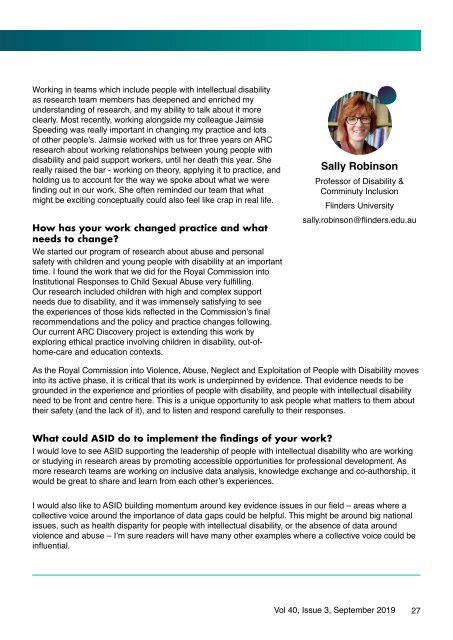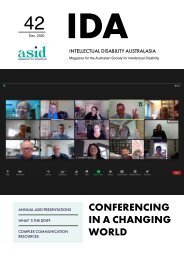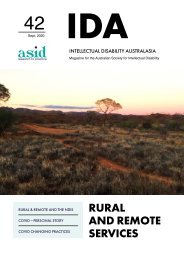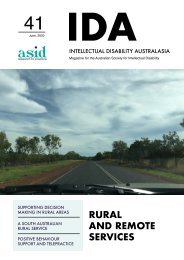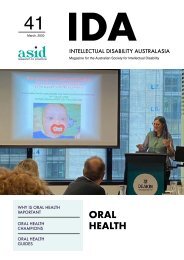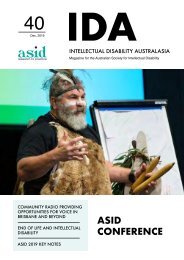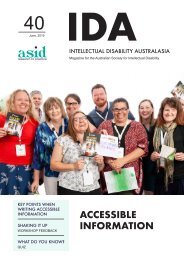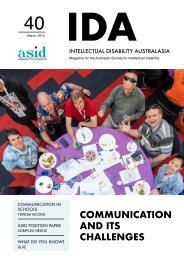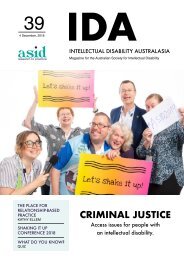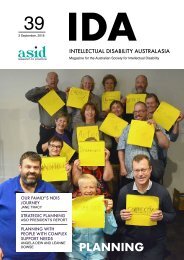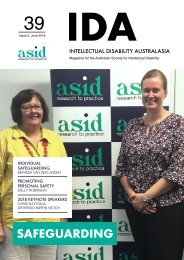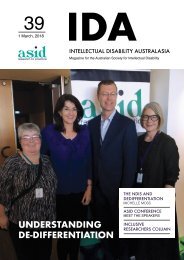IDA Magazine Vol 40 Iss 3 (Sep 2019)
- No tags were found...
Create successful ePaper yourself
Turn your PDF publications into a flip-book with our unique Google optimized e-Paper software.
Working in teams which include people with intellectual disability<br />
as research team members has deepened and enriched my<br />
understanding of research, and my ability to talk about it more<br />
clearly. Most recently, working alongside my colleague Jaimsie<br />
Speeding was really important in changing my practice and lots<br />
of other people’s. Jaimsie worked with us for three years on ARC<br />
research about working relationships between young people with<br />
disability and paid support workers, until her death this year. She<br />
really raised the bar - working on theory, applying it to practice, and<br />
holding us to account for the way we spoke about what we were<br />
finding out in our work. She often reminded our team that what<br />
might be exciting conceptually could also feel like crap in real life.<br />
How has your work changed practice and what<br />
needs to change?<br />
We started our program of research about abuse and personal<br />
safety with children and young people with disability at an important<br />
time. I found the work that we did for the Royal Commission into<br />
Institutional Responses to Child Sexual Abuse very fulfilling.<br />
Our research included children with high and complex support<br />
needs due to disability, and it was immensely satisfying to see<br />
the experiences of those kids reflected in the Commission’s final<br />
recommendations and the policy and practice changes following.<br />
Our current ARC Discovery project is extending this work by<br />
exploring ethical practice involving children in disability, out-ofhome-care<br />
and education contexts.<br />
Sally Robinson<br />
Professor of Disability &<br />
Comminuty Inclusion<br />
Flinders University<br />
sally.robinson@flinders.edu.au<br />
As the Royal Commission into Violence, Abuse, Neglect and Exploitation of People with Disability moves<br />
into its active phase, it is critical that its work is underpinned by evidence. That evidence needs to be<br />
grounded in the experience and priorities of people with disability, and people with intellectual disability<br />
need to be front and centre here. This is a unique opportunity to ask people what matters to them about<br />
their safety (and the lack of it), and to listen and respond carefully to their responses.<br />
What could ASID do to implement the findings of your work?<br />
I would love to see ASID supporting the leadership of people with intellectual disability who are working<br />
or studying in research areas by promoting accessible opportunities for professional development. As<br />
more research teams are working on inclusive data analysis, knowledge exchange and co-authorship, it<br />
would be great to share and learn from each other’s experiences.<br />
I would also like to ASID building momentum around key evidence issues in our field – areas where a<br />
collective voice around the importance of data gaps could be helpful. This might be around big national<br />
issues, such as health disparity for people with intellectual disability, or the absence of data around<br />
violence and abuse – I’m sure readers will have many other examples where a collective voice could be<br />
influential.<br />
<strong>Vol</strong> <strong>40</strong>, <strong>Iss</strong>ue 3, <strong>Sep</strong>tember <strong>2019</strong><br />
27


